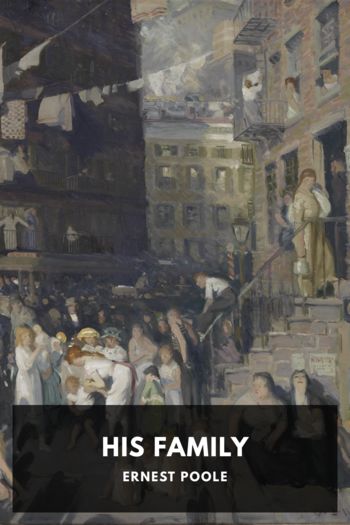His Family - Ernest Poole (ereader for comics .txt) 📗

- Author: Ernest Poole
Book online «His Family - Ernest Poole (ereader for comics .txt) 📗». Author Ernest Poole
“You’d better have a doctor!”
“Telephone Allan—Allan Baird. He knows about this,” she muttered. And Roger ran down to the telephone. He was thoroughly frightened.
“All right, Mr. Gale,” came Baird’s gruff bass, steady and slow, “I think I know what the trouble is—and I wouldn’t worry if I were you. I’ll be there in about ten minutes.” And it was hardly more than that when he came into Deborah’s room. A moment he looked down at her.
“Again?” he said. She glanced up at him and nodded, and smiled quickly through set teeth. Baird carefully examined her and then turned to Roger: “Now I guess you’d better go out. You stay,” he added to Sarah, the maid. “I may need you here awhile.”
About an hour later he came down to Roger’s study.
“She’s safe enough now, I guess,” he said. “I’ve telephoned for a nurse for her, and she’ll have to stay in bed a few days.”
“What’s the trouble?”
“Acute indigestion.”
“You don’t say!” exclaimed Roger brightly, with a rush of deep relief. Baird gave him a dry quizzical smile.
“People have died of that,” he remarked, “in less than an hour. We caught your daughter just in time. May I stay a few moments?”
“Glad to have you! Smoke a cigar!”
“Thanks—I will.” As Baird reached out for the proffered cigar, Roger suddenly noticed his hand. Long and muscular, finely shaped, it seemed to speak of strength and skill and an immense vitality. Baird settled himself in his chair. “I want to talk about her,” he said. “This little attack is only a symptom—it comes from nerves. She’s just about ready for a smash. She’s had slighter attacks of this kind before.”
“I never knew it,” Roger said.
“No—I don’t suppose you did. Your daughter has a habit of keeping things like this to herself. She came to me and I warned her, but she wanted to finish out her year. Do you know anything about her school work?”
“Yes, I was with her there this week.”
“What did she show you?” Baird inquired. Roger tried to tell him. “No, that’s not what I’m after,” he said. “That’s just one of her usual evenings.” For a moment he smoked in silence. “I’m hunting now for something else, for some unusual nervous shock which she appears to me to have had.”
“She has!” And Roger told him of her visit up to Sing Sing. Baird’s lean muscular right hand slowly tightened on his chair.
“That’s a tough family of hers,” he remarked.
“Yes,” said Roger determinedly, “and she’s got to give it up.”
“You mean she ought to. But she won’t.”
“She’s got to be made to,” Roger growled. “This summer at least.” Baird shook his head.
“You forget her fresh air work,” he replied. “She has three thousand children on her mind. The city will be like a furnace, of course, and the children must be sent to camps. If you don’t see the necessity, go and talk to her, and then you will.”
“But you can forbid it, can’t you?”
“No. Can you?”
“I can try,” snapped Roger.
“Let’s try what’s possible,” said Baird. “Let’s try to keep her in bed three days.”
“Sounds modest,” Roger grunted. And a glimmer of amusement came into Baird’s impassive eyes.
“Try it,” he drawled. “By tomorrow night she’ll ask for her stenographer. She’ll make you think she is out of the woods. But she won’t be, please remember that. A few years more,” he added, “and she’ll have used up her vitality. She’ll be an old woman at thirty-five.”
“It’s got to be stopped!” cried Roger.
“But how?” came the low sharp retort. “You’ve got to know her trouble first. And her trouble is deep, it’s motherhood—on a scale which has never been tried before—for thousands of children, all of whom are living in a kind of hell. I know your daughter pretty well. Don’t make the mistake of mixing her up with the old-fashioned teacher. It isn’t what those children learn, it’s how they live that interests her, and how they are all growing up. I say she’s a mother—in spirit—but her body has never borne a child. And that makes it worse—because it makes her more intense. It isn’t natural, you see.”
A little later he rose to go.
“By the way,” he said, at the door, “there’s something I meant to tell her upstairs—about a poor devil she has on her mind. A chap named Berry—dying—lungs. She asked me to go and see him.”
“Yes?”
“I found it was only a matter of days.” The tragic pity in Baird’s quiet voice was so deep as barely to be heard.
“So I shot him full of morphine. He won’t wake up. Please tell her that.”
Tall, ungainly, motionless, he loomed there in the doorway. With a little shrug and a smile he turned and went slowly out of the house.
XIIIDeborah’s recovery was rapid and determined. The next night she was sitting up and making light of her illness. On the third day she dismissed her nurse, and when her father came home from his office he found gathered about her bed not only her stenographer but both her assistant principals. He frowned severely and went to his room, and a few minutes later he heard them leave. Presently she called to him, and he came to her bedside. She was lying back on the pillow with rather a guilty expression.
“Up to your old antics, eh?” he remarked.
“Exactly. It couldn’t be helped, you see. It’s the last week of our school year, and there are so many little things that have to be attended to. It’s simply now or never.”
“Humph!” was Roger’s comment. “It’s now or never with you,” he thought. He went down to his dinner, and when he came back he found her exhausted. In the dim soft light of her room her face looked flushed and feverish, and vaguely he felt she was in a mood where she might listen to reason. He felt her hot dry hand on his. Her eyes were closed, she was smiling.
“Tell me the





Comments (0)